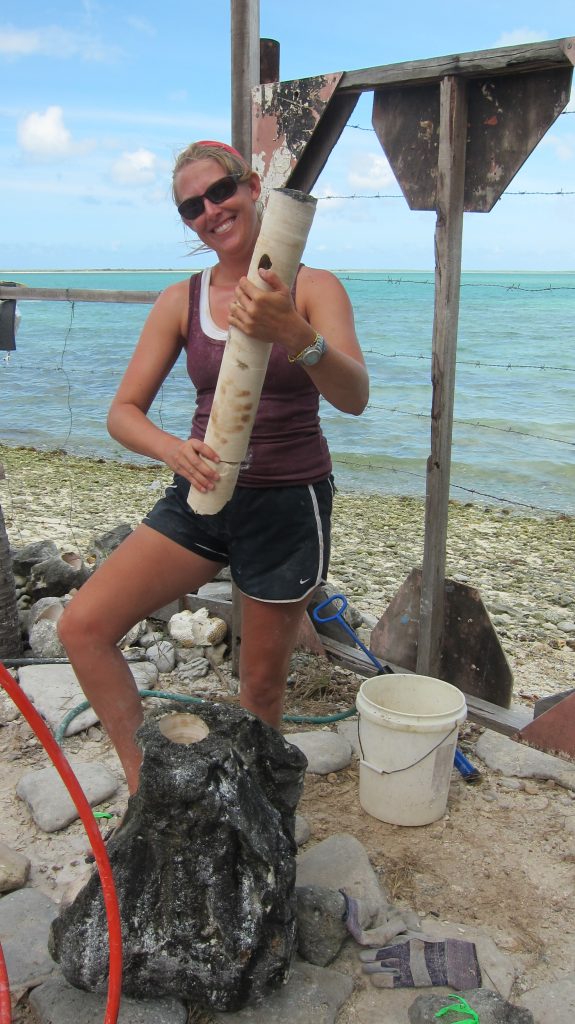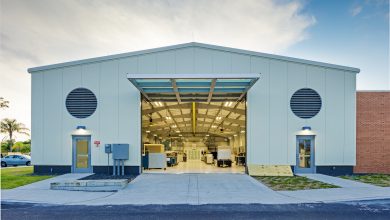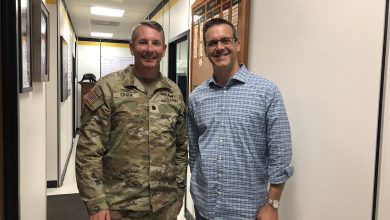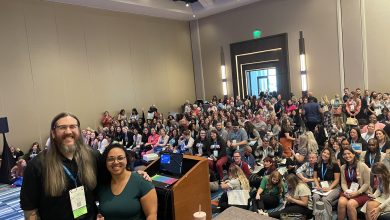Ph.D. Alumna featured in Science Magazine for Work with Florida Coral Reefs
Lauren Toth ’13 Ph.D. is making strides in understanding the degradation of Florida’s coral reefs, and people—Science magazine people, to be specific—are noticing.
A coral-reef geologist at the U.S. Geological Survey (USGS) with more than a decade of experience researching and working with Florida’s coral reefs, Toth is all too familiar with the abuses that have halted reef development and left it vulnerable to erosion throughout the last 3,000 years.
At the USGS, Toth researches modern and historical reef ecology and uses reefs’ geological records to dig into their longer-term histories, evaluate past climate and sea-level variability and discern how they’ve reacted to the environmental changes.

“I believe that those insights can provide important clues that can help us understand the modern decline of reefs and to predict what we may expect of reefs in the future,” Toth says.
Daily, she manages and supervises students and technicians on a variety of research projects that range from assessing how coral reefs and reef environments evolve to measuring modern and historical coral growth and erosion—a task that, thanks to minimal existing data, can be easier said than done.
Toth, however, is growing that data pool by building on the work of her USGS predecessors.
In 1998, USGS scientists drilled metal rods into 12 dead coral colonies off the coast of Key Largo. As detailed in the Science article, Toth and her colleague, Ilsa Kuffner, recently capitalized on the placement of these rods, using the cement that holds them in place, which was once flush with the coral, as a reference point to measure erosion.

Using this same logic, Toth has expanded the experiment to include a series of similar stakes that Florida Fish and Wildlife Conservation Commission scientists implanted at 46 sites along the Florida Keys almost 25 years ago for an annual photographic survey.
She developed a portable tool—the prototype of which she tested this month alongside the Science reporter—that positions a rotating metal bar on the stake and measures the distance to the reef surface using PVC rulers.
“The idea is that, in the short term, we can see how much erosion has already occurred by measuring the elevation of epoxy used to secure the stakes when they were installed in 1995,” she says. “These measurements will also give us a good starting point for measuring future reef erosion.”

The prototype worked, and scientists who complete Florida’s photographic survey this summer will use the device to measure about half the rods at each site, according to the Science article. Toth will also use these photographic surveys, along with historic surveys of the sites, to generate 3D reef mosaics that determine how much erosion has flattened reef habitats over the last 25 years.
In her recent study, Toth suggests changes in climate are the likely cause of the suppressed reef growth in the Florida Keys over the last 3,000 years, as reefs are very sensitive to both warm and cool temperature extremes.
“Ultimately, it will take global action on climate change and active reef management to stop or reverse the declines we’ve seen on coral reefs,” Toth says, “but those changes can start locally with efforts by each of us to reduce our carbon footprints.”
Without change, however, the consequences could be tremendous.

“The problem with losing the geological structure of coral reefs is that the structure provides the foundations for all of the ecosystem services reefs provide: habitat for fish and other marine life and buffering wave energy during storms,” Toth says.

In fact, the National Oceanic and Atmospheric Administration estimates that Florida’s reefs contribute about $8 billion a year to the regional economy by supporting fisheries and tourism, Toth says.
Likewise, at their current elevation, south Florida reefs provide $675 million of flood reduction per year, and a recent USGS study suggests that a loss of just 3 feet of reef elevation would put more than 5,000 additional buildings in the area at risk of flooding during major hurricanes.
“The majority of coral-reef research focuses on understanding the living community on the reef: the corals, fish and other biota,” she says. “One of the main messages that I try to get across in my research is that the nonliving, geologic structure is just as important—or even more important—than that living veneer.”
Having been raised in south Florida, Toth grew up snorkeling on the same reefs in the Keys that she now studies.
“Even in my short lifetime, I have seen dramatic changes in the reefs that made me fall in love with marine science,” she says. “It breaks my heart to see how degraded those reefs are today, but I do still have hope that we can restore the health of reefs for future generations.”





